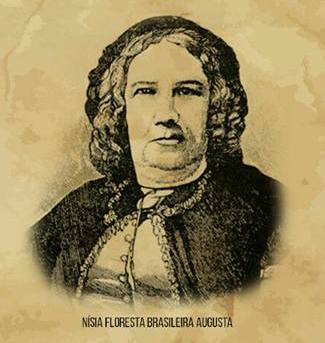|
[originally published on the New Narratives Facebook page on 5 March 2021]
Dionísia Gonçalves Pinto, also known as Nísia Floresta Brasileira Augusta, is our woman philosopher of March. I’m going to briefly talk about her life here, and we’ll look at some interesting passages of her works next week. Nísia Floresta was born on October 12th, 1810, in a small town called Papari, in the Northeastern Brazil. Today, the city is called Nísia Floresta to honour her. Nísia’s name is a penname. “Nísia” is a short name from “Dionísia”. “Floresta” is the name of the place she was born at, “Brasileira” means Brazilian, and “Augusta” is a tribute to her spouse, Manuel Augusto. Nísia Floresta is considered to be the first Brazilian woman to publicly talk about women’s rights and to have her own column in her local newspaper. She published 15 books that were translated into English, Italian, and French. One of her books, Consigli a mia figlia, had two editions in Italy and was studied at Venetian schools. She travelled to Italy, England, Greece, France, Germany and Portugal, and compared how those countries treated women. She interacted with other leading intellectuals such as Almeida Garret, Alexandro Herculano, Alexandre Dumas, Victor Hugo, and Auguste Comte. Hugo and Comte were her close friends as their letters show. Her first book was published in 1832, when she was 22 years old. In Direitos das Mulheres e Injustiça dos Homens, Nísia questioned the quality of women’s education in Brazil. There were three editions for this book. A few years later, Nísia founded two schools, Augusto and Brasil, where History, Mathematics and Latin were taught to women. Both schools were considered scandalous at that time. Her first poem was published in 1849. In A lágrima de um Caeté, Nísia explored the degradation of Brazilian first natives through the exploitation of white men, mentioning rapes, land appropriation, and cultural destruction. She also mentioned the horror of one of many civil wars that were emerging in a Brazil before the Republic. Because she explored not only the suffering of women during the Revolução Praieira, but also of everybody, Nísia gained the attention, and further, the respect of Brazilian liberals. In 1853, Nísia wrote her masterpiece called Opúsculo Humanitário, a collection of essays defending women’s emancipation. In it, Nísia presents her famous argument that society’s progress can only be evaluated by how important women are in it. She died of pneumonia in Rouen, France, in 1885. -MM Picture retrieved for research purposes from: Museu Nisia Floresta (Facebook Page) https://www.facebook.com/museunisiafloresta.rn/photos/1246164508821619
1 Comment
12/22/2021 03:10:01 pm
Obrigada por valorizar o trabalho da grande escritora Nísia Floresta.
Reply
Leave a Reply. |
Authors
Jacinta Shrimpton is a PhD student in Philosophy at the University of Sydney. She is co-producer of the ENN New Voices podcast Archives
May 2024
Categories
All
|

 RSS Feed
RSS Feed